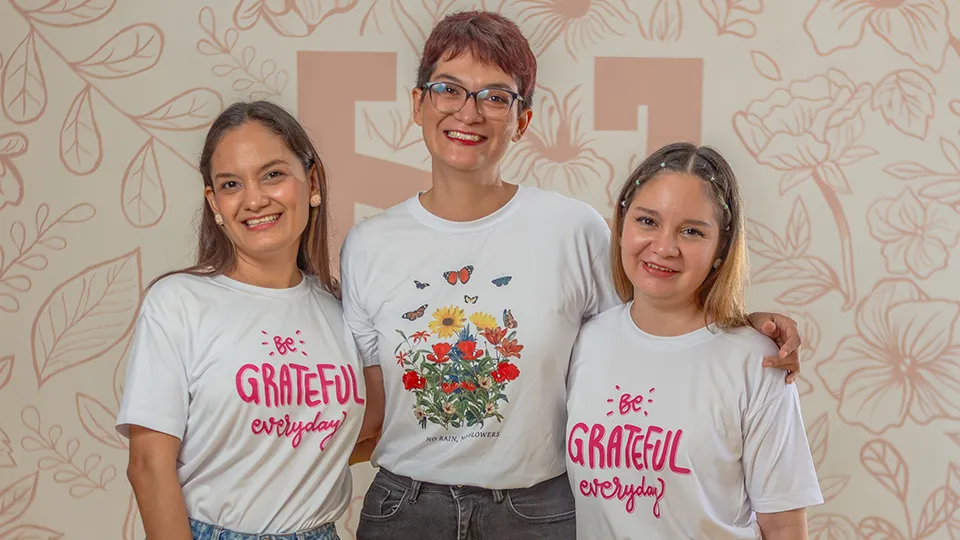The economic cost of the COVID-19 pandemic can be told in big numbers. 114 million jobs lost. USD 2.7 trillion wiped from the global economy. But it should also be understood on a smaller scale. As the pandemic raced across the world, micro-, small and medium-sized enterprises (MSMEs) suddenly found themselves unable to trade in the physical stores and markets they were used to. Small-scale business owners had to quickly adopt e-commerce to stay afloat.
The Herreras sisters – Nancy, Erika and Gisela – were three entrepreneurs forced to adapt. They set up their fashion business, Herreras, in early 2019, borrowing their mother’s sewing machine to create handbags and other accessories for women. Once they started selling their products outside their home in Sonsonate, El Salvador, the sisters’ hand-painted floral designs and high-quality craftsmanship quickly caught the attention of friends and neighbors.

By October 2020 their business had grown to the point where they were able to open a physical retail space in Las Cascadas Mall in the capital of San Salvador. However, with the pandemic continuing to limit in-person shopping throughout the country, the Herreras sisters decided it was time to go digital.
E-commerce and intellectual property mentoring
While the switch to digital platforms saved many MSMEs, it brought with it a slew of new challenges . E-commerce requires technical skills and a nuanced understanding of intellectual property (IP) in a digital context that many small-scale business owners lack. This can make it difficult to both protect one’s own IP while avoiding infringements on other businesses’ property.
In response to these challenges, in March 2023 the World Intellectual Property Organization (WIPO) launched an e-commerce and IP mentoring program for MSMEs in Central America and the Dominican Republic. Across 13 seven-week courses, the program promoted the use of IP for small-scale businesses, demonstrating how effective IP management can not only strengthen business strategies but serve as an important source of investment and financing. By the end of the program, in March 2024, it had worked with 154 people and 49 MSMEs from across Costa Rica, El Salvador, Guatemala, Honduras, Panama and the Dominican Republic.
Challenges of registering IP
Nancy, Erika and Gisela encountered some of these challenges when creating a website for Herreras. Building trust among customers and sourcing high-quality photos of their products proved particularly difficult. They also began the process of trademarking their brand but had to pause the process due to a lack of knowledge about IP law. This is a common experience for startups: the complexity of IP law, and the time, effort and resources required to navigate it, holds back many entrepreneurs from successfully protecting their IP when they represent themselves.

In early 2023, Herreras was one of ten Salvadoran MSMEs selected to participate in WIPO’s e-commerce and IP mentoring program. During the course, which included one-on-one mentoring with e-commerce and IP experts, the Herreras website was reviewed and updated to improve the customer experience and bring the website in line with the requirements of El Salvador’s Consumer Protection Law. This required ensuring that all products were accurately and precisely presented, described and priced, as well as adding details of their construction to the website. The sisters also received the information needed to restart their trademark application.
The company’s founders also learned about copyright, an alternative way to protect their products that – unlike trademarks – does not require registration. Copyright protection is particularly suited to Herreras’ products, as it may extend to original pictorial, graphic or sculptural features that can be identified separately from the utilitarian aspects of an article. Such products are called ‘works of applied art’ or ‘works of artistic craftsmanship’ and are distinguished by a double function, being regarded as both artistic creations and serving a practical purpose as useful, everyday products. Examples include jewelry, lamps, furniture – and Herreras’ unique bags and accessories.
Establishing a nationwide presence
The training and support the Herreras sisters received in WIPO’s mentoring program has helped them continue to build their business. They have since secured an agreement to sell their product line – which has now expanded to include purses, earrings, applique and hand-painted T-shirts – in Almacenes Siman, a Central American department store, and even appeared on Salvadoran television to promote their unique accessories. In April 2024, they opened their own physical store in Zona Rosa, the social hub of San Salvador.
The return to physical retail has not come at the expense of e-commerce, and Herreras continues to sell its products on its improved website, as well as build its customer base via social media. Nor has business expansion distracted Nancy, Erika and Gisela from their handcrafted ethos. All their products continue to be made with minimal use of machines, prioritizing quality and individuality over mass production – the qualities that inspired them to borrow their mother’s sewing machine five years ago.



